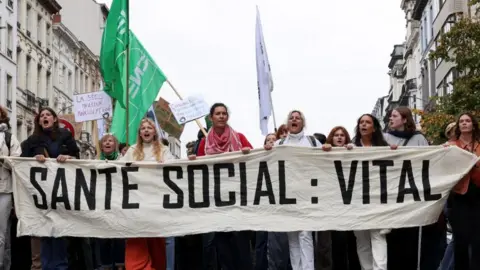Bruno BoelpaepIn Brussels and Paul KirbyEurope digital editor

 Reuters
Reuters
Demonstrators held a banner that read "social health: vital"
Tens of thousands of people have taken to the streets in Brussels as part of a national strike over government reforms and spending cuts that has brought flights to a halt and severely disrupted public transport.
Belgium's three big unions are protesting over pensions and other measures by Prime Minister Bart de Wever's centre-right government aimed at cutting the budget deficit.
There were no services at Belgium's second biggest airport at Charleroi, and all departures and many of the arrivals were cancelled at Brussels Airport.
Although trains were running, most buses, trams and underground trains in the capital ground to a halt.
Shipping at Europe's second biggest port Antwerp was suspended until Wednesday because of understaffing, and more than 100 ships waited in the North Sea for permission to dock at three ports, according to Belgium's MDK maritime and coastal services.
Belgium has been hit by several strikes since Flemish nationalist Bart de Wever came to office last February.
By midday, police said 80,0000 protesters had joined the demonstration in the Belgian capital.

 Bruno Boelpaep/BBC
Bruno Boelpaep/BBC
The unions were expecting more than 100,000 Belgians to join the Brussels protest
Public sector workers were protesting against austerity measures and a government increasingly perceived as leaning right.
They wound through the streets of central Brussels, many wearing the red or green colours of the main unions.
A key issue for the unions is the government's plan to increase the number of days Belgians work per year before they can receive their pensions, as well as the end of special schemes for several sectors including military and railway workers.
De Wever's government has also announced measures including a maximum two-year limit on claiming unemployment benefit. Further cuts are planned for next year's budget, and some proposals such as reducing child benefit or raising VAT have already been floated.
"It's about time we came together," said Anaïs, 29. "It's always the same part of the population that has to tighten their belts."

 Bruno Boelpaep/BBC
Bruno Boelpaep/BBC
Anaïs complained that the government's pension reforms would not affect wealthier Belgians
Holding a placard showing the number 67 with a red line through it, she objected to the pension age going up: "65 is enough. 67 is too late. We are asked to work more, to work longer hours. It's not fair."
The rise in pension age was adopted 10 years ago, well before De Wever's government came to office, but it remains deeply unpopular and the government is aiming to ringfence it and make it more expensive to retire earlier.
Thierry Bodson of the ABVV union told demonstrators that "the fight against the De Wever government is not just the fight of a day or a year - it's for a whole generation", Belga news agency reported.
"We need to fight for our rights," said mother-of-two Vanessa, who had travelled from Charleroi.
"I'm worried about the measures that will be taken. What sort of future will my children have?" she told the BBC.
It is not just the federal government under pressure to cut spending. Belgium's complex multi-level governance means regional authorities are also imposing austerity measures.
The ruling coalition in Belgium's largely French-speaking Walloon region has announced that teachers in the higher tiers of secondary schools will have to work an extra two hours per week.
Many of them joined the protests today.
"Nothing is clear, and it's really worrying, but if higher-level teachers have to work more, many jobs will be cut," said Sandrine, 48, who works in education.
Although the protests were largely peaceful, there were several incidents of vandalism and arson early in the morning and some people in masks clashed with police later on.

 3 weeks ago
17
3 weeks ago
17










 English (US) ·
English (US) ·